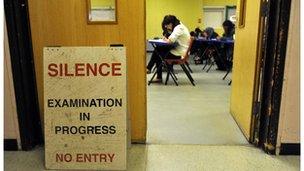English GCSE: Senior exam board figure quits AQA
- Published

Stephen McKenzie said the AQA board's handling of GCSE boundary changes was "morally repugnant"
A senior exam board figure has resigned over the shifting of English GCSE grade boundaries which left thousands of pupils with lower grades than expected.
Stephen McKenzie quit the exam board AQA on Wednesday after 16 years as a GCSE English moderator.
In his resignation letter Mr McKenzie said the grade boundary shift was "the worst decision ever made by AQA".
He told BBC News: "I could not go on working for them - to be frank AQA English has fallen apart."
Mr McKenzie's resignation came as the exam boards and the exam regulator Ofqual were given more time to consider a legal challenge from teaching unions, schools and local authorities asking them to regrade English GCSE papers.
The alliance has written formally to Ofqual and the exam boards AQA and Edexcel challenging the refusal to regrade GCSE English papers in England. They are threatening to seek a judicial review after thousands of pupils scored lower-than-expected results when grade boundaries were raised midway through the year.
Ofqual has held an inquiry into the problems but stands by the gradings despite complaints that pupils who sat the papers in January got higher grades than those who sat them in June.
In his resignation letter Mr McKenzie called the handling of the affair "morally repugnant" and "disingenuous".
He said that claims that teachers had marked controlled assessments too generously were based on "paltry evidence" and called the moderation of the qualification "poor, stressed and chaotic".
He added that AQA had reneged on guidance to schools about the standard needed to achieve a C grade and said that this had hit the most vulnerable part of the student population hardest.
'Massive damage'
"We have in this whole sorry business the classic social disaster scenario; mismanagement succeeded by chaos, hurt innocents succeeded by collusion between official bodies to suppress the reality of the disaster.
"The various AQA English specifications have as their spine texts - To Kill a Mockingbird, Of Mice and Men, The Crucible, An Inspector Calls - where ordinary but principled people stand up for social justice at whatever cost.
"If I see anyone at AQA English do this any time soon, I will reconsider my decision not to work for them. Otherwise I mourn the passing of a once fine institution."
In his letter Mr McKenzie quotes emails from a senior English assessor at AQA who states that the changes to grade boundaries between January and June did "massive damage" and "instantly hit the most vulnerable" pupils.
In particular the assessor's emails focus on the raising of the grade C boundary on the lower tier English exam paper by 10 marks between January and June.
Leaked emails
Mr McKenzie, vice principal of Morley Academy in Leeds, says this paper is marketed at the students who would have had to work the hardest to achieve a C or better and who needed the grade to enter apprenticeships, employment or further education.
Earlier this month letters between another exam board, Edexcel and the regulator Ofqual, were leaked to the Times Educational Supplement. These showed that Ofqual ordered the board to make grade boundary changes against its will just two weeks before the results were published.
The TES says the Mr McKenzie's resignation letter and the emails reveal "that assessors from AQA, the board with the biggest market share in GCSE English, were just as concerned as their Edexcel counterparts about the grading changes".
Brian Lightman, of the Association of School and College Leaders, said: "This is another example of the overwhelming evidence for regrading these exams as a matter of urgency in the interests of fairness."
AQA said it was unable to comment because of pending legal action over GCSE English.
- Published21 September 2012
- Published31 August 2012
- Published11 September 2012
- Published23 August 2012
- Published11 September 2012